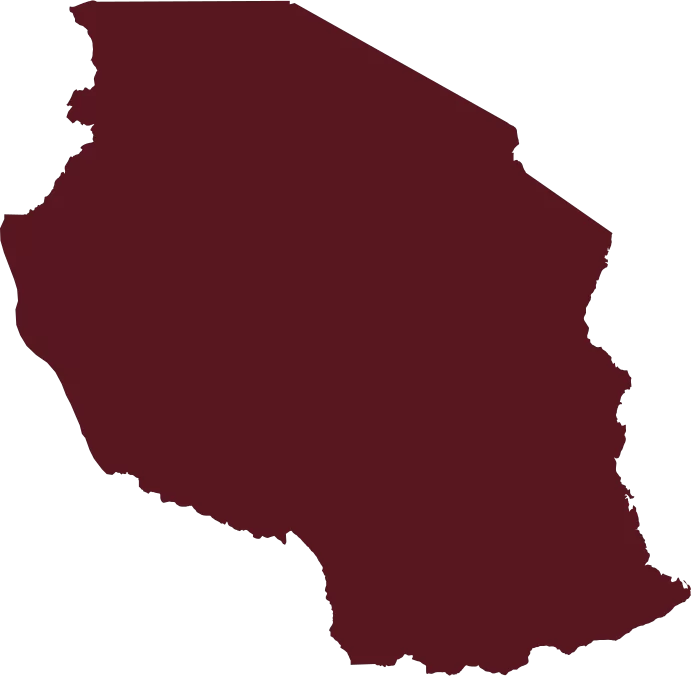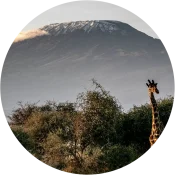Tanzania
ABOUT TANZANIA
Tanzania is one of Africa’s safest places for not just tourists but also for the locals. Besides many tourist attractions like Mount Kilimanjaro, Serengeti safari, and Lake Manyara, the country’s captivating culture, friendly people, and delicious traditional cuisines attract millions of visitors every year from different parts of the world.
It means from spectacular game reserves full of wildlife and breathtaking beaches to luxurious accommodations and splendid culture, the Tanzania safari trip gives tourists once-in-a-lifetime experience. This beautiful country offers a myriad of wonderful places to visit. No matter when you visit, Tanzania will always offer you a world-class hiking experience as it is the home to 16 famous national parks with the largest concentration and diversity of wildlife.

WHY CHOOSE TO VISIT TANZANIA OVER OTHER AFRICAN COUNTRIES?
Tanzania’s thrilling outdoor activities, luxury safari rides, beautiful wildlife viewing opportunities and the Great Wildebeest Migration alone are enough to beat other travel destinations across the continent. Although the country is considered a green land, it is like a visual treat for the eyes as you will find all colors here. Tanzania tours and safaris offer a travel-friendly environment and Tanzania is considered one of the safest African countries.
Not only is it widely recognized as a secure and welcoming country for safari tours in Africa, but it is also a dream vacation destination for people seeking relaxation in luxurious self-indulgence. That is why Tanzania is one of the best safari destinations in Africa, and Tanzania tours and safaris are becoming increasingly popular among tourists.
HIGHLIGHTS

Wildlife Parks and Reserves
Tanzania is the ultimate destination for the best African safari tours for families. It is home to 22 national parks renowned for their scenic beauty and exceptional game-viewing. All national parks and reserves in Tanzania have the greatest concentrations of diverse wildlife in the world, thus all promising incredible safari adventures.

Mt. Kilimanjaro
As Africa’s tallest mountain and one of the most iconic natural wonders of the world, Mount Kilimanjaro in Tanzania entices hikers, climbers and everyone in between to visit. Trek to Tanzania to climb Mount Kilimanjaro, Africa’s tallest mountain, and see spectacular views, capture photographs of breathtaking vistas and witness unique species of plants and animals.

Zanzibar
No Tanzania safari trip is complete without a Zanzibar safari tour. Relax on the breathtaking beaches, swim in the warm turquoise waters and have great food with your feet covered in mesmerizing white sands in Zanzibar. It is the ideal place for people seeking a beach, marine and cultural & historical vacation. The Zanzibar safari tour is also famous for its abundance of spice plantations and fascinating history.
Favorite Tanzania Trips
WHEN SHOULD YOU TRAVEL TO TANZANIA?
The country has a tropical climate that varies by region and altitude. If you are visiting Tanzania for the first time, you must understand the difference between safari high season in Tanzania vs low season. Here is a snapshot to help you better understand the weather in Tanzania so you can look for a Tanzania safari package accordingly.

BEST WEATHER
The dry seasons are considered to be the best weather conditions to climb as there is a lower possibility of precipitation
WORST WEATHER
The rainy seasons are the worst times to climb the mountain as it can be very wet, and visibility may be low due to heavy clouds
BEST TIME
The best times to climb Mt Kilimanjaro are from the beginning of December through the beginning of March, and then from late June through the end of October
HIGH SEASON
Group climbs are scheduled to correspond with the dry season (December through March, late June through the end of October) as they are the busiest months
LOW SEASON
From the end of March to early June, the crowds are gone during this period and it is considered to be the low season
Contact Us

Noemi Casado, Spain
Suzanne Richard, England
Nathan Burke, USA
Jennifer Riley, USA
John Mathew, USA
FAQ's
Swahili is Tanzania’s official language. However, as a bilingual country, English is commonly spoken in this East African nation. Other tongues recognized in the country include those of various Bantu and Nilotic ethnic groupings. The majority of Tanzanians are fluent in their native language, and the general population has a good understanding of English. During the British colonial period, English was widely spoken in Tanzania. Since independence, English, along with Swahili, has served as a medium of communication in schools.
The best time to visit Tanzania is during the lengthy dry season, which lasts from July to September. These are regarded as the ideal months for trips on safari, the Great Migration, hiking, and beach vacations in Zanzibar. Of course, these are high travel months. They are going to be busier, and certain lodges, motels, and parks will charge higher fees. If you prefer a more private experience, consider travelling during the brief rainy season, which runs from the end of October until December. If possible, avoid going during the long rainfall of April and May. Rainstorms are frequently strong and abrupt, forcing last-minute cancellations of events.
Tanzania is generally a safe and easy nation to visit. Visitors will be safer in Tanzania if they travel through a local tour operator rather than travelling on their own. Visitors should take measures and obey all government travel advice to avoid any adverse incidents while visiting Tanzania. Terrorist attacks are uncommon in Tanzania, and general crimes such as petty thefts, street muggings, and bag snatchings can be avoided by staying away from crime areas that are dangerous.
The Tanzanian shilling is the currency used across the country. The Republic of Tanzania’s currency is the Tanzanian shilling (TZS), which replaced the East African shillings. One shilling is made up of A100 senti, and banknotes and coins are in circulation in quantities ranging from 500 to 10,000 shillings. The worth of the Tanzanian shilling is set by the forex markets because it is a freely floating currency. Visa and MasterCard are generally accepted, and there are numerous ATMs dispensing local money across the country.
A visa is necessary for travel to Tanzania via the United States or Canada. Currently, this is available at arriving airports and crossings of borders and is good for 90 days. A valid passport is required. Your passport has to be valid for at least six months beyond the date you plan to depart Tanzania. Indians are not granted visas on arrival and must apply for them before travelling. Arriving without a visa makes you an undocumented traveller. You may be penalized or refused admission to Tanzania.
There are no mandatory vaccines in Tanzania; nonetheless, we suggest that you consult with your local travel clinic regarding the most up-to-date recommendations, especially regarding malaria prophylactics. If you are travelling from or have transited via an airport in a country where yellow fever is prevalent, you must provide proof of vaccination.
Tanzania boasts countless national treasures, and there are many things to see and do when you visit this charming country. Tanzania is most renowned for its national parks, which make up nearly 30% of the country. Serengeti National Park, the Ngorongoro Crater, Tarangire National Park, the town of Selous Game Reserve, and Katavi National Park are among the most well-known.
Next, Tanzania is well-known for its trekking and hiking trails. Climbing Mount Kilimanjaro, Mt. Meru, the Crater Highlands, and the Mahale Mountains, as well as hiking the Usambara Mountains, Kitulo National Park, or the Southern Highlands, are among the most popular hikes. Tanzania is also known for its beautiful beaches and islands, including Zanzibar Island, Mafia Island, Pemba in Zambia Island, Tanganyika Lake, Sange Beach, Matema Beach, and Pangani.
To begin with, Tanzania offers several opportunities for family safaris and beach vacations due to its plentiful wildlife, sandy beaches, and convenient logistical approach. There are numerous options for Zanzibar beach holidays combined with safari experiences, and there are no long internal flights, making it an ideal location for children and families.
The enjoyment of the journey is actually shared by children, parents, and grandparents, resulting in a fond memory to keep forever. Creating an ideal family schedule requires careful planning and consideration on multiple fronts.
You will find a variety of lodging alternatives on your Tanzania vacation. Luxurious hotels can be located in national parks and safari circuits, with ratings ranging from three to five stars. Heritage buildings have been adapted for housing in Stone Town’s twisting lanes, while huge resort-style accommodations may be found on Zanzibar Island. Hotels in Tanzania range from high-end luxury hotels in cities that are popular tourist destinations to mid-range international and low-cost BB hotels in smaller communities. You can get the best accommodations by booking your tour with Reality Tours and Safaris.
Your Tanzania safari will cost between $500 and $3000 or more. Tanzania Safari prices include roundtrip airport transfers, hotels, Tanzania food (three full meals each day), domestic transport, park charges, Tanzania Safari crew costs, drinking water, and so on. International flight prices, visa fees, travel coverage costs, and prolonged tour stays are all big omissions from the cost. To learn more about how to travel on a budget or how to make your Tanzania tour cost-effective, contact Reality Tours and Safaris travel specialists now.
Homosexuality is prohibited in Tanzania, which includes the Zanzibar Islands. Public shows of affection, regardless of orientation, are discouraged in parts of Africa, and homosexuality is considered a cultural taboo. LGBTQ visitors to Tanzania should use caution and be mindful of local attitudes.
When travelling around Tanzania, it is advisable to drink bottled water, as several brands are widely accessible and provided in every eatery and resort. When dining at street food places, avoid ice, raw veggies, and salads. Fruits and vegetables must constantly be washed and peeled for safety.
High-end resorts and restaurants treat their food items with an antiseptic solution. Additionally, seafood and fish are typically fresh around the coast, but be sure everything is thoroughly cooked.
Airport Julius Nyerere International is the best airport for travellers to the Southern Parks, including Mikumi National Park, Ruaha, the Udzungwa Mountains, and the Selous Game Reserve. Airport International Kilimanjaro Tanzania’s northern region is home to this airport. The airport is frequently used by travellers since Northern Circuit tourism sites are well known for being the best places for tourists. It is situated adjacent to the recreational destination of Mount Kilimanjaro National Park.
Airport Zanzibar Abeid Amani Karume (ZNZ) serves as the primary airport serving the Zanzibar Archipelago. With growing traffic, it’s only a few kilometers south of Stone Town and provides daily access to the archipelago for tourists from across the world.
The cuisine served in safari camps and lodges varies, yet it is consistently good and wonderful. Gourmet cooks make fresh bread and prepare soups, salads, and dinners that could easily grace tables at the world’s best restaurants. Soups, salads, cold meat, pasta meals, fish and meat dishes, and breads all have an international character.
Tanzanian towns and villages typically serve simpler cuisine. Nyama choma, or plain grilled meat, is a popular dish served with sauce, rice, chips, or ugali (cornmeal). Indian cuisine is very widely disseminated. Local beers, such as Serengeti, Safari, Kilimanjaro, and banana beer, are outstanding, as are international beers and wines.
Tanzania’s population is around 60 million. Tanzania is one of Africa’s most ethnically diverse countries, home to over 125 different ethnic groups and more than 100 languages spoken throughout the country. Tanzanians are well-known because of their generosity, and they frequently welcome travellers to explore their stunning scenery, animals, and culture. Meeting the people is one of the most effective ways to learn more about a nation and its culture, and it is highly advised on your Tanzania journey!








